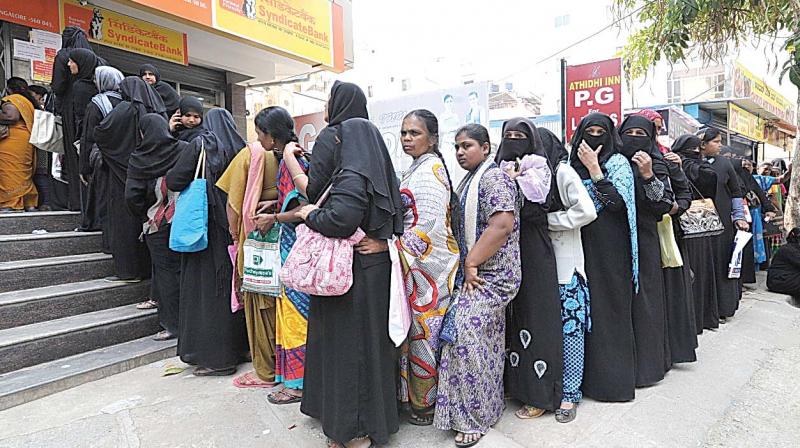On the contrary: Kindly wait, you are in the queue

Last Sunday I attended a wedding at the Bangalore Palace and what should have been a joyous occasion was marred by what most people feel, ranks fairly low on the list of social crimes. One is the obnoxious habit of queue-jumping, something that we, despite stiff competition from the Chinese, have raised to an art form. While some 5000 or so guests were waiting patiently in line to wish the newlyweds, two over-nourished women used the well-worn ruse of saying hello to a couple standing in line; and within seconds they had achieved their objective and muscled their way onto the stage to the collective chagrin of the rest of us suckers whose time clearly didn’t matter. The best was yet to come. When they reached the dais, this odd couple asked their friends to go ahead saying, “You go first, after all we have barged in.” Really, pehle aap, so you do know that fairness doesn’t come out of a jar of Fair & Lovely?
I asked them their names, saying, “Madam, I would like to know who you are because you must be a VIP and my parents advised me to network on social occasions.” Alas, sarcasm was clearly wasted on these specimens. They stared at me as if I had made an indecent proposal. Misty-eyed Anglophiles wax nostalgic about the days of the Raj but the concept of “pehle aap” existed in Hindustan long before any memsahib brandished her copy of Emily Post…
IIM(A) Professor, V. Raghunathan, the author of “Locks, Mahabharatha & Mathematics”, spells out the reasons why we get a C minus on Manners 101. “We Indians are a self-centred lot who lack a basic sense of fairness or concern for others. Why else would we be among the most corrupt in the world? Or the most chaotic, garrulous and disrespectful of authority, including that of the highest court of the land?” he says. “We must inculcate the value of fairness towards others, in our families and in our schools as part of everyday education. People jump queues when the regulation of a queue is weak. You can never jump a waiting list at a good educational institute such as IIM which goes to prove that one can create systems which intrinsically disallow it. But these are highly formal systems, while most queues we deal with day to day are informal. In places where much of the regulation must be self-imposed, chaos unfortunately prevails.”
The average human being is destined to spend about four years queuing (hopefully not all in one go) over a lifetime. That’s more, on average, than the time we spend shopping, exercising, cooking, driving or…never mind. While standing in a queue, an Indian is unable to twiddle his thumbs or play Sudoku; instead, he will be busy craning his neck to the left or the right or standing on tiptoe to see the tamasha. To use Raghunathan’s droll simile, “The person at the counter sees not just the face of the man in front of him, but is treated to a multiplicity of faces around one head, to the left, right and above, presenting the illusion of a revered multi-headed Indian deity.”
Which brings me to my point via Byapannahalli: this is precisely why any road-widening in Bengaluru is an exercise in futility and serves no useful purpose. Cutting down trees to widen a road is the equivalent of wearing a mask to avoid pollution or having your olfactory nerves surgically removed to escape the stench of uncollected garbage. Murphy’s Law states that if any given road is widened by one metre, 73.4 motorists will automatically jump a red light to occupy the space made available. OK, I made that last statistic up but perhaps, dear reader, a certain degree of artistic license is permissible in a city where queue jumping is the norm and where the RTO issues licences to the criminally insane at the drop of a wallet?

